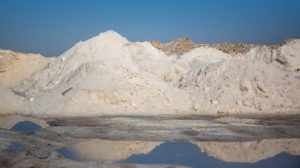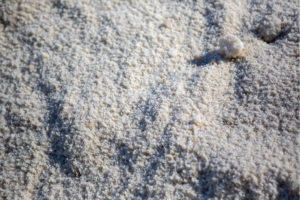By Bassam Almohor
Four hundred meters below sea level, on the shores of the Dead Sea, a small, old, rusty refinery is bustling around the clock to produce the finest and richest mineral salt in the world.
No sign on Highway 90, the road that crosses the Jordan valley from north to south, points to the refinery. On a junction to the north of the Dead Sea, a narrow potholed road leads to abandoned buildings in the east, a place that some years ago used to bustle with tourists and bathers yet now features merely a few ghost-like buildings. (Location: 31.774603, 35.515253).
According to Hussam Hallak, the CEO of the company, the Dead Sea has retracted over a distance of 1.5 kilometers over the past 50 years, leaving behind the refinery. Over 30 percent of the Dead Sea has evaporated. The sad reality of the lowest lake on our planet.
This refinery is at the heart of the West Bank Salt Company, established 60 years ago by Othman Hallak, a chemical engineer who graduated from Ohio University. It is the only Palestinian company operating at the shores of the Dead Sea.
In 1964, Hallak reached an agreement with the Jordanian government and assumed the ownership of what was then a small Jordanian/British Potash factory to reopen it as a salt extraction plant.
Since then, the company has been producing traditional commercial table salt that is delivered to markets in the West Bank, Gaza, and Jordan. Dead Sea brine is pumped into 12 ponds that spread over the 600 dunums operated by the refinery. The saline is left for eight months to evaporate in the hot, arid Dead Sea climate where temperatures reach over 40°C and there is very little precipitation. Once crystalized, the salt is milled in the factory.
A large effort is underway to open a showroom of products where visitors will be able to watch a short movie about the history of the plant and relax in a café, watching the deserted surface and reminiscing over the past. In the near future, a shuttle bus is planned to take visitors from the refinery over the dried-up Dead Sea bed to the water. A journey of 1500 meters and counting.
Take a moment, turn left when going south on Road 90, and visit this hidden treasure. Drive until you reach huge piles of white sand lying next to old and abandoned, fenced-in, graffitied seaside buildings. Do not panic! This is where your sodium chloride, NaCl, is produced.
The very friendly, kind-hearted, sun-tanned faces of the workers will welcome you to a journey through 60 years of refining your table salt. An experience like no other.
For more information and guidance, contact Hussam Hallak by phone via 052-454-0564 or 02-994-8964 or on Facebook @West.Bank.Salt.
Bassam Almohor can be reached at almohor@gmail.com, 052-458-4273, or through Facebook: @palestinestreetlife.





